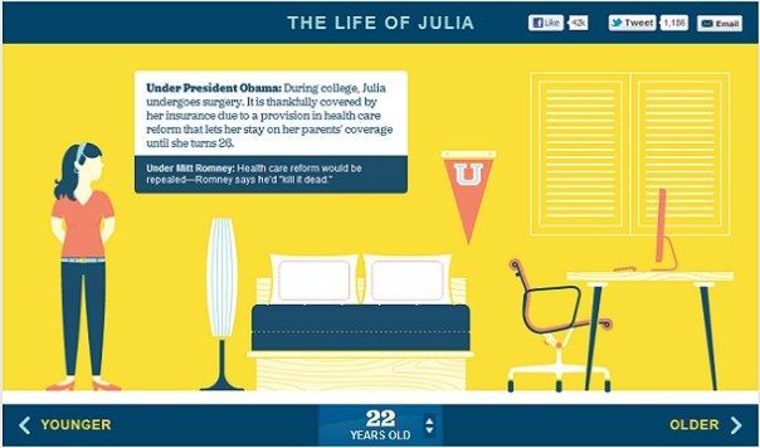There's an old joke that goes something like this: my neighbor went to public schools before joining the military. He went to college on the G.I. Bill, bought his first home through the FHA, received his health care through the V.A. and Medicare, and now receives Social Security. He's a conservative because he wants to get the government off his back.
I thought about this joke about a week ago, when the Obama campaign unveiled an interesting online feature called "The Life of Julia," featuring a woman at 12 different stages of her life -- ages 3 to 67 -- and "how President Obama's policies help one woman over her lifetime -- and how Mitt Romney would change her story."
The point of the project is fairly obvious: throughout a woman's life, Obama has an agenda that provides protections and benefits that offer opportunities, while Romney has an agenda that does largely the opposite. Head Start programs help "Julia" at age 3; college aid benefits her at 17; the Affordable Care Act covers her at age 22; the Lilly Ledbetter Fair Pay Act protects her at 23, Medicare covers her at 65, etc.
The right is not at all fond of "Julia's" story. As Joan McCarter noted yesterday, House Budget Committee Chairman Paul Ryan (R-Wis.) called the online feature "creepy" and an extension of a "government-centered society." Ross Douthat is thinking along similar lines.
Jon Chait makes the case that conservatives seem to be missing the point.
Obviously, the feature is about government programs because it's about politics. If Obama's website decided to publish a novella about a character whose only interactions were with Head Start and the Affordable Care Act, it would certainly be creepy. But its purpose is to illustrate how public policy affects a person. That, rather than Douthat's imagined paternalism, explains why Julia's life story is missing friends, a husband, and so on."The Life of Julia" also portrays government in a positive way because this is its contrast with Romney, who has tied himself to a sweeping anti-government agenda. It's not an embrace of unlimited government, it's an attack on the extremely truncated vision of government proposed by the Republicans. [...]And this is the policy contrast of the election. It's not Obama's government-centric society against Romney's market-centric society. It's Obama keeping something resembling the status quo intact -- a relatively small government that partially offsets some of the worst imperfections of the market - against the Republican plan to rewrite the social compact.
Reading through the "Life of Julia" slideshow, it's hard to imagine the American mainstream finding anything "creepy." It doesn't show a model in which the government controls anyone's life; it shows public institutions that offer everyone opportunities to succeed.
The next question should be to press Ryan and Douthat on what, exactly, they find "creepy" about the specific measures within the feature. Is Head Start scary government intervention? How about student loans? Is health care coverage for young adults (backed by 85% of the country) considered excessive? How about Medicare? Is access to affordable contraception and equal-pay laws offensive? How about small-business loans?
The right finds "The Life of Julia" to be an extension of a socialistic worldview. Fine. Then let's have a debate about which of the public benefits conservatives intend to destroy, present that to the electorate, and see whether voters agree.
Incidentally, Judith Grey reports that Republicans have been seething about the Obama campaign's feature, but women seem to like it quite a bit.
